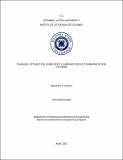Please use this identifier to cite or link to this item:
http://hdl.handle.net/11547/9373| Title: | CHANNEL ESTIMATION USING DEEP LEARNING FOR 5G COMMUNICATION SYSTEMS |
| Authors: | Hussain, Hamouda |
| Keywords: | 5G Communication Systems Channel Estimation |
| Issue Date: | 2021 |
| Abstract: | Users’ starvation for more reliability, high speed and capacity wireless communication have caused the invention of 5G NR communication system. As we know the recent communication technologies are designed on the basis of conventional communication philosophies, which significantly limit additional performance perfections and that is the root of daunting limitations. one of the important areas of the mobile communication is the wireless channel estimation method which can significantly improve the performance of the whole system, and particularly for 4G-systems and 5G-systems. In this thesis we examine the baseline channel estimation methods used for orthogonal frequency division multiplexing (OFDM) systems, such as the minimum mean square error ‘MMSE’ estimator and the least square (LS) estimator. We studied the MMSE and LS estimators’ architecture an examine their performances. And prove that the MMSE estimator performance is better but it is computational complexity is high, in contrary the LS estimator has low complexity with low performance. Therefore, in this thesis we propose a different and efficient solution for channel estimation which is based on machine learning techniques and in particular we used deep learning techniques to overcome the performance issues associated with the traditional channel estimation baseline methods, we assess the proposed estimator performance on basis of Long Short-Term Memory (LSTM) and symbol error rate for 16 QAM systems for a multi-user communication system. We also evaluate estimator computational accuracy and feasibility |
| URI: | http://hdl.handle.net/11547/9373 |
| Appears in Collections: | Tezler -- Thesis |
Files in This Item:
| File | Description | Size | Format | |
|---|---|---|---|---|
| 10391795.pdf | 2.88 MB | Adobe PDF |  View/Open |
Items in DSpace are protected by copyright, with all rights reserved, unless otherwise indicated.
